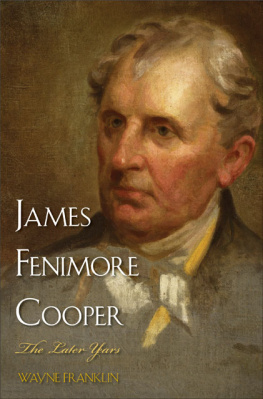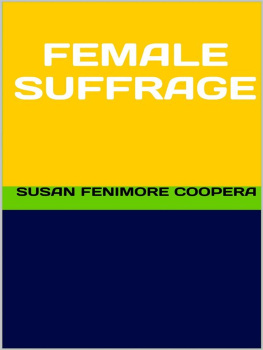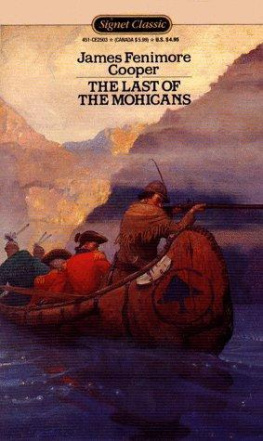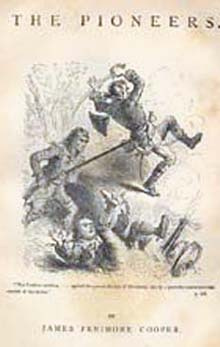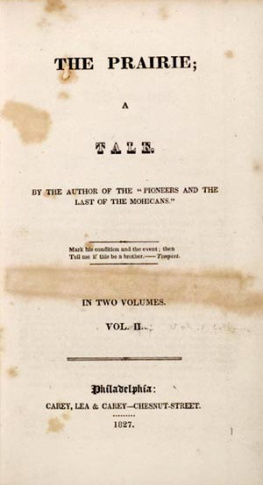Cooper James Fenimore - James Fenimore Cooper
Here you can read online Cooper James Fenimore - James Fenimore Cooper full text of the book (entire story) in english for free. Download pdf and epub, get meaning, cover and reviews about this ebook. City: New Haven;Conn, year: 2007, publisher: Yale University Press, genre: Detective and thriller. Description of the work, (preface) as well as reviews are available. Best literature library LitArk.com created for fans of good reading and offers a wide selection of genres:
Romance novel
Science fiction
Adventure
Detective
Science
History
Home and family
Prose
Art
Politics
Computer
Non-fiction
Religion
Business
Children
Humor
Choose a favorite category and find really read worthwhile books. Enjoy immersion in the world of imagination, feel the emotions of the characters or learn something new for yourself, make an fascinating discovery.

- Book:James Fenimore Cooper
- Author:
- Publisher:Yale University Press
- Genre:
- Year:2007
- City:New Haven;Conn
- Rating:3 / 5
- Favourites:Add to favourites
- Your mark:
- 60
- 1
- 2
- 3
- 4
- 5
James Fenimore Cooper: summary, description and annotation
We offer to read an annotation, description, summary or preface (depends on what the author of the book "James Fenimore Cooper" wrote himself). If you haven't found the necessary information about the book — write in the comments, we will try to find it.
James Fenimore Cooper — read online for free the complete book (whole text) full work
Below is the text of the book, divided by pages. System saving the place of the last page read, allows you to conveniently read the book "James Fenimore Cooper" online for free, without having to search again every time where you left off. Put a bookmark, and you can go to the page where you finished reading at any time.
Font size:
Interval:
Bookmark:
The Early Years
WAYNE FRANKLIN

Published with assistance from the Louis Stern Memorial Fund.
Copyright 2007 by Wayne Franklin.
All rights reserved.
This book may not be reproduced, in whole or in part, including illustrations, in any form (beyond that copying permitted by Sections 107 and 108 of the U.S. Copyright Law and except by reviewers for the public press), without written permission from the publishers.
Designed by Mary Valencia.
Set in Fournier MT type by Integrated Publishing Solutions.
Printed in the United States of America.
Library of Congress Cataloging-in-Publication Data
Franklin, Wayne.
James Fenimore Cooper : the early years / Wayne Franklin.
p. cm.
Published with assistance from the Louis Stern Memorial Fund.
Includes bibliographical references and index.
ISBN 978-0-300-10805-7 (alk. paper)
1. Cooper, James Fenimore, 17891851. 2. Cooper, James Fenimore, 17891851Childhood and youth. 3. Novelists, American19th centuryBiography. I. Title.
PS1431.F73 2007
813.2dc22 2006031247
A catalogue record for this book is available from the British Library.
The paper in this book meets the guidelines for permanence and durability of the Committee on Production Guidelines for Book Longevity of the Council on Library Resources.
10 9 8 7 6 5 4 3 2 1
Accounting for the debts incurred during a long-lived writing project is a pleasurable obligation. I recall mine in chronological order. For the late Frank Nash, whose skilled mentoring of pupils at the Albany Academy bolstered my boyhood reading interests, I offer tardy public thanks. I never go back to Moby-Dick without thinking of how well Nash introduced us to it in the fifth form. To Thomas L. Philbrick, who assigned The Pioneers in a class on the American novel that I happened to take while he visited at Union College in the fall of my senior year, I am particularly happy to give this new token of my appreciation and gratitude. He taught that class so well that he had to put up with me again in a Melville seminar during the spring semesterand then for another five years, since I followed him as a graduate student back to his permanent home at the University of Pittsburgh. His support and interest hardly stopped with my graduation from Pitt in 1972. On reading an essay on Cooper that I published in 1992, he suggested that I might think about undertaking this project; for better or ill, I listened to him. Since then, he has read various drafts of different chapters and shared not only his lucid and charitable comments but also the fruits of his and his wife Mariannes own unstinted labors as editors of Cooper books. For their son Nathaniel, who provided me encouragement and some behind-the-scenes support as this book made its way to print, I am both thankful and, recalling his parents generosities, envious.
No one working on James Fenimore Cooper can stand fully outside the shadows cast by the late scholar James Franklin Beard. His magisterial edition of Coopers Letters and Journals was only the most obvious of his many accomplishments. Without his skilled negotiations with the Cooper family from the 1940s on, the archival riches still in its hands might not have made their way to the public institutions where they now reside. Beards plan for a biography of Cooper based on those sources ran afoul of his heroic efforts as he led a team of editors (including the Philbricks) committed to bringing out fresh versions of nearly half of Coopers books. My debt to Beard is substantial, not only for those two publishing ventures but also for materials he gathered for his own project, and for the example of his career. I hasten to add, however, that this volume incorporates nothing drafted by him for his own biography. For all I assert, I am to blame.
To the Cooper family, especially to Henry S. F. Cooper of New York City and Cooperstown, I am similarly grateful. Henry has shared not only stories but also materials. Furthermore, his detached but supportive attitude toward my venture has been ideal. While I always thought of him and his kin as among my intended readers, I have never felt the least pressure to write for them in the first instance. Similarly, although I have benefited enormously from the astute and pathbreaking work of Alan Taylor, whose book on Coopers father makes regular appearances in my text and notes, I of course try to tell the sons story here. At times, as I was surprised to discover, it diverged in remarkable ways from that of the father as Alan powerfully re-created it.
Friends and colleagues who have critiqued parts or all of what I have written will see, I hope, that they have improved it in measurable ways. Aside from the Philbricks, the most important of these are Dan Peck and Jeff Walker, along with Lance Schachterle, Allan Axelrad, Hugh MacDougall, and Bob Madison. Such intellectual friends as Larry Buell, Richard Forman, John Hanson Mitchell, Kent Ryden, and Frances Clark (the Wits) deserve goodly mention, along with Steve Bullock, John Seelye, Gary Williams, Rich Morgan, and Ives Goddard. And I cannot overlook the personal support and interest of the late Sherman Paul, or of Bob Sayre, Carl Klaus, Guy Rotella, Harvey Green, and Frank Blessington. Recently, I have been warmly pleased by the place my new colleagues at the University of Connecticut have made for me in their midst. In particular, I would mention Bob Tilton and Bob Gross. My editor at Yale, John Kulka, believed in this project and enacted that belief in various ways at various junctures. I am especially grateful to my copy editor for the press, Jessie Dolch, who has helped improve the book in innumerable ways.
Financial backing is critical for projects such as mine. In 19941995, I held a National Endowment for the Humanities fellowship at the American Antiquarian Society. It allowed me to finish a thorough study of the Cooper materials there. From 1994 to 2005, I relied on the very generous support of the Stanton W. and Elisabeth K. Davis Foundation, which provided time to conduct my research and funds to defray costs of travel and materials. The financial support of the English department at the University of Connecticut, made possible by its head, Bob Tilton, and Dean Ross MacKinnon of the College of Liberal Arts and Sciences, has helped see the project to completion. Twice, in 1993 and again in 1997, Dan Peck included me in NEH summer seminars that allowed me to try out some of the ideas in this book. For a pleasant pair of weeks in the fall of 1997, through the good efforts of Jeff Walker, I was able to air other ideas as the Fae Rawdon Norris lecturer at Oklahoma State University. In 20042005, I held a generous fellowship for the Simon R. Guggenheim Foundation that allowed me to finish this volume and continue my work on Cooper past its end.
Institutions sometimes imagine future scholarly projects with such foresight that a lucky writer arrives to find materials handily arranged. I have discovered that to be the case especially at the American Antiquarian Society, where Joanne Chaison, Marie Lamoureux, Tom Knoles, Dennis Laurie, Susan Anderson, Ellen Dunlap, Nancy Burkett, John Hench, Caroline Sloat, and Marcus McCorison (along with the librarys pages and the steady stream of scholars who labor there) have in their various ways made my work in Antiquarian Hall so rewarding. At the New York State Historical Association in Cooperstown, similar help has come from Wayne Wright, Adele Johnson, and Susan Dear. Staff at Yales Beinecke Library and the New York State Library in Albany have been equally helpful and efficient during my briefer visits to those institutions. Bryan Thompson of the Town of DeKalb Historical Association graciously shared documents with me as well as his own writings on the history of that northern New York town, where the Cooper family was heavily involved after 1803.
Font size:
Interval:
Bookmark:
Similar books «James Fenimore Cooper»
Look at similar books to James Fenimore Cooper. We have selected literature similar in name and meaning in the hope of providing readers with more options to find new, interesting, not yet read works.
Discussion, reviews of the book James Fenimore Cooper and just readers' own opinions. Leave your comments, write what you think about the work, its meaning or the main characters. Specify what exactly you liked and what you didn't like, and why you think so.

